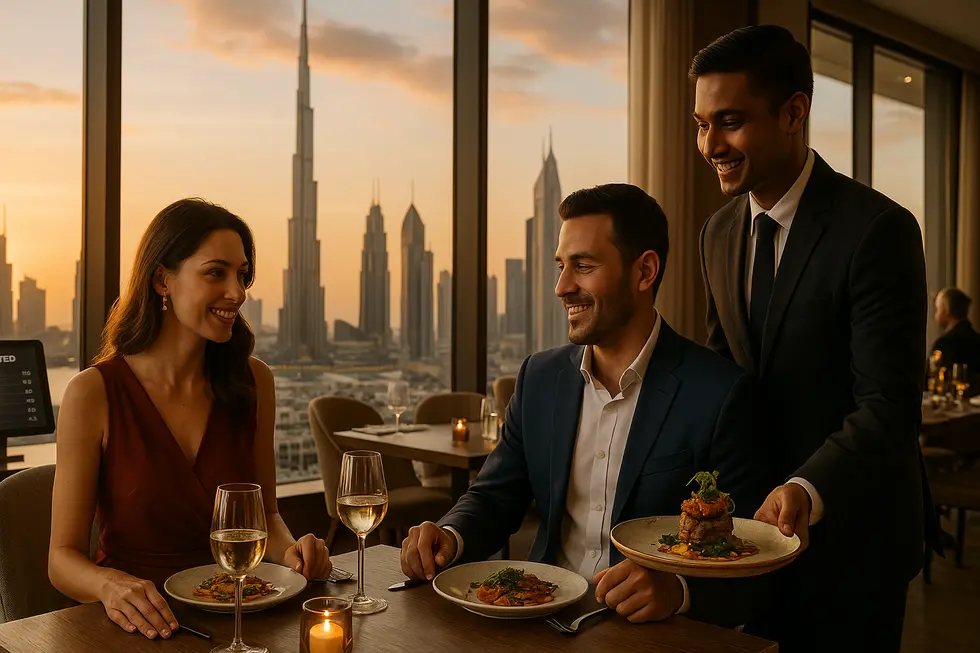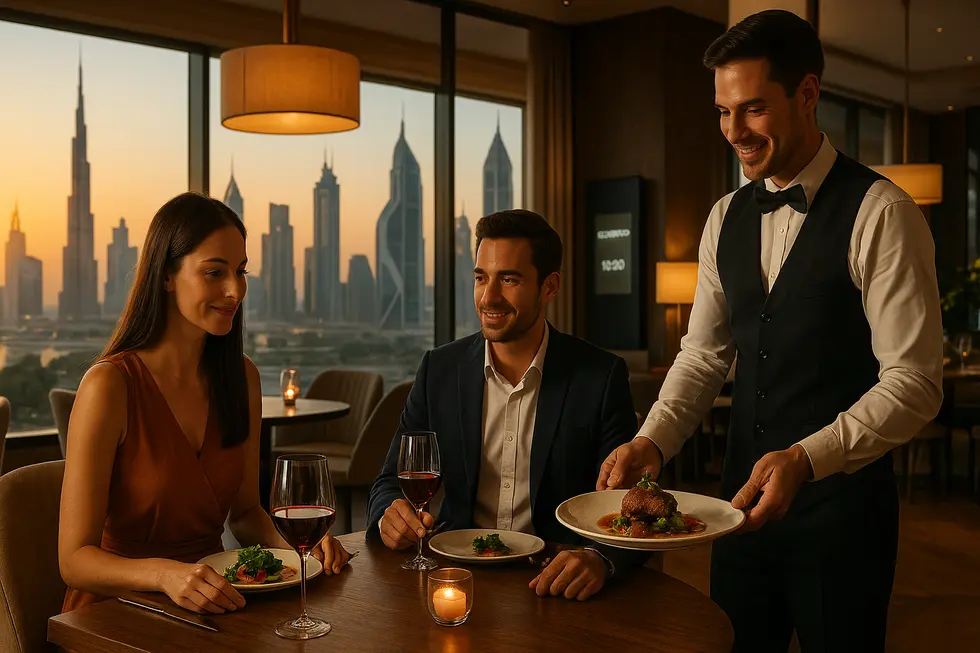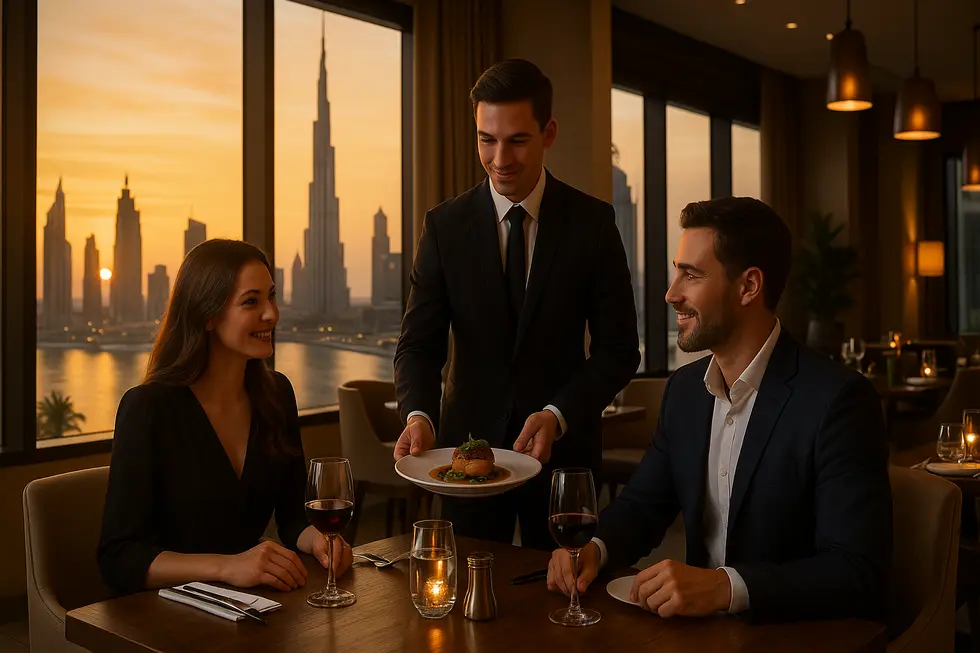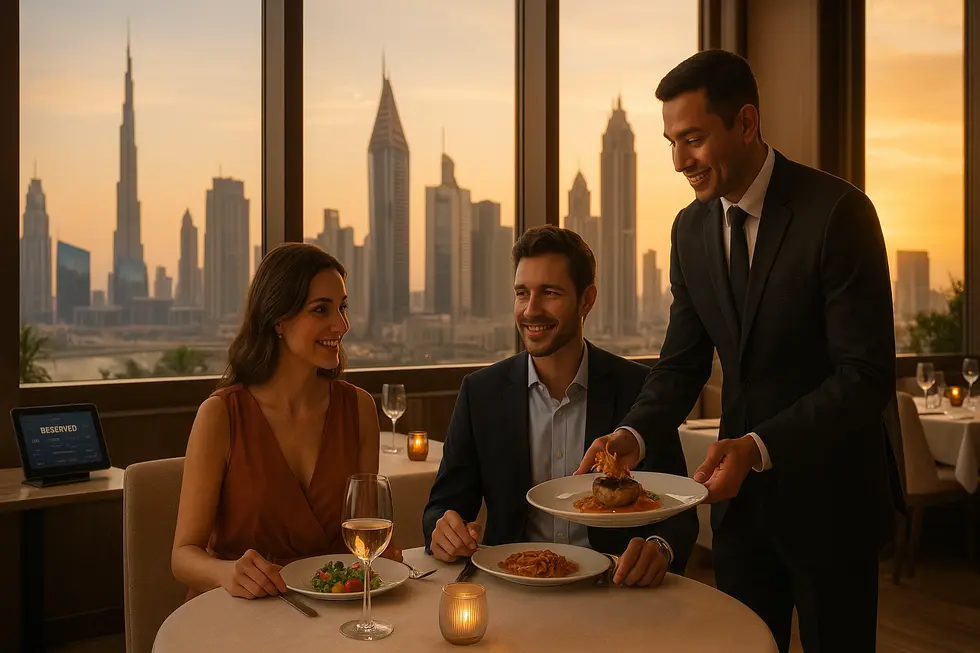Stand Out in Dubai: How Restaurant Brands Win the 4-Star Market
Drive visibility and loyalty for your restaurant brand in Dubai with tech, market positioning and storytelling tailored to the 4-star segment.
Hotel Branding & Positioning
Digital Distinction: How Tech and Data Make Dubai Restaurant Brands Memorable
 Digital innovation is the quiet architecture behind memorable restaurant brands in Dubai. Defining a clear positioning remains essential, but technology translates that positioning into repeatable customer experiences. Mobile ordering, contactless payment and AI-driven personalization convert a promise of convenience into everyday reality. These tools reduce friction at the moment of purchase and create opportunities to surprise customers with offers and recommendations that feel individually tailored.
Digital innovation is the quiet architecture behind memorable restaurant brands in Dubai. Defining a clear positioning remains essential, but technology translates that positioning into repeatable customer experiences. Mobile ordering, contactless payment and AI-driven personalization convert a promise of convenience into everyday reality. These tools reduce friction at the moment of purchase and create opportunities to surprise customers with offers and recommendations that feel individually tailored.
Behind the guest-facing layer, integrated systems unify front-of-house and kitchen workflows. Real-time ordering and inventory feeds remove guesswork, speed service and protect quality. When operational efficiency improves, staff can deliver the hospitality that distinguishes luxury brands. Technology therefore supports both scale and the human moments that matter to Dubai’s discerning diners.
Digital channels also shape a brand’s emotional footprint. A consistent visual identity across social media, the website and in-app content reinforces recognition. Storytelling that uses short video, user-generated content and narrative captions amplifies cultural relevance. In Dubai, where social influence is strong, these moments build trust faster than a single grand opening. Loyalty programs delivered via apps let brands reward frequency while collecting consented data to refine offers and menu choices.
Data analytics convert customer signals into actionable trends. Heatmaps of menu popularity, segmented ordering behavior and feedback loops inform menu optimization and concept evolution. Brands that monitor trends can pivot to health-conscious options or introduce sustainable practices that align with local values. Sustainability signals—clear sourcing stories, waste reduction metrics and recyclable packaging—enhance reputation among aware consumers.
Execution matters: choose technologies that reflect the brand’s promise and simplify the guest journey. Prioritize integration, privacy and measurable KPIs. When tech supports a distinct concept, it becomes part of the brand narrative rather than an add-on. For a practical guide on building this blended brand strategy tailored to Dubai, see the detailed market overview from Marc Cross: https://www.marccross.co.uk/insights/startup-restaurant-branding-uae-dubai
Economic Positioning and Market Strategy: How Restaurants Carve Space in Dubai’s Saturated Market
 Dubai’s growth creates clear commercial rules for restaurant brands. The city’s foodservice market is projected to reach approximately $52.76 billion by 2030, with a CAGR near 17.8%. Strong tourism, including roughly 14 million visitors in 2022, and a large expatriate population drive demand. Those figures mean both opportunity and fierce competition: more than 13,000 food and drink outlets already operate in the emirate, so economic positioning is a strategic necessity rather than an afterthought.
Dubai’s growth creates clear commercial rules for restaurant brands. The city’s foodservice market is projected to reach approximately $52.76 billion by 2030, with a CAGR near 17.8%. Strong tourism, including roughly 14 million visitors in 2022, and a large expatriate population drive demand. Those figures mean both opportunity and fierce competition: more than 13,000 food and drink outlets already operate in the emirate, so economic positioning is a strategic necessity rather than an afterthought.
Successful brands begin by choosing the right segment. Full-service and experiential venues are expanding fastest, so themed, luxury, and immersive concepts gain traction. At the same time, quick-service and delivery-led formats capture convenience-driven customers. Positioning clearly around audience, price point, and experience allows brands to focus resources where they matter: menu development, service design, and location economics.
Margins in Dubai can be squeezed by rent, labor, and logistics. Smart brands offset costs through menu engineering, dynamic pricing, and revenue diversification such as private dining, events, and partnerships. Technology plays a vital role: mobile-first ordering, robust delivery integrations, CRM-driven loyalty, and contactless payments improve operational efficiency and lifetime value. Innovation in food — plant-based options, health-forward dishes, and signature items — attracts repeat visits and social media attention.
Cultural fluency and premium positioning also matter. Multicultural menus, authentic international flavours, and locally tailored experiences resonate with residents and tourists. For brands targeting the luxury segment, exclusivity, exceptional service, and singular experiences are differentiators.
Government support and strategic locations amplify success. Business-friendly policies and tourism initiatives under national agendas make scale-up possible. Brands that align economic strategy with market trends build resilience and relevance. For ongoing perspectives on market shifts and strategy, see the markus-mensch blog.
Source: Restroworks Dubai Restaurants Statistics — https://restroworks.com/
Navigating Culture, Politics and Regulation: How Dubai’s Restaurant Brands Differentiate Themselves
 Dubai’s culinary stage demands more than a great menu. Brands that rise above weave cultural sensitivity, geopolitical awareness and regulatory mastery into a single strategic thread. The city’s mosaic of expatriates and tourists means menus must feel authentic and relevant. That requires balancing regional traditions, such as halal certification and family-friendly service, with global trends like plant-based options and transparent nutrition. When a brand adapts recipes and presentation to local expectations, it wins repeat visits and social shares.
Dubai’s culinary stage demands more than a great menu. Brands that rise above weave cultural sensitivity, geopolitical awareness and regulatory mastery into a single strategic thread. The city’s mosaic of expatriates and tourists means menus must feel authentic and relevant. That requires balancing regional traditions, such as halal certification and family-friendly service, with global trends like plant-based options and transparent nutrition. When a brand adapts recipes and presentation to local expectations, it wins repeat visits and social shares.
Economic and political dynamics shape operational choices. Dubai competes with regional hubs for dining tourism, so restaurants create signature experiences that justify travel and spend. At the same time, brands must be agile: shifting supplier networks, contingency plans for cross-border disruptions and flexible pricing help protect margins when geopolitical shifts alter costs or consumer confidence. A brand seen as resilient and responsive gains trust among investors and customers alike.
Regulation is equally decisive. Compliance with food safety, licensing and health codes is non-negotiable. Brands that embed regulatory standards into daily operations convert compliance into a competitive asset. Visible hygiene practices, documented sourcing, and staff training become part of the brand story, not just a back-office requirement. Government initiatives that promote tourism and innovation create openings for brands that align with official priorities, such as healthier menus or tech-enabled service.
Technology, storytelling and customer experience link these threads. Mobile ordering, efficient delivery and loyalty programs meet diverse consumer habits. Storytelling that explains sourcing, culinary heritage and service philosophy builds emotional bonds. Luxury positioning and exclusive experiences appeal in Dubai’s high-end segment, while accessible authenticity wins among residents seeking comfort and value.
Successful brands treat culture, geopolitics and regulation as design constraints, not barriers. They translate those constraints into menu creativity, operational resilience and clear, consistent brand signals that resonate across Dubai’s many communities.
Further reading: https://www.restroworks.com/blog/dubai-restaurants-statistics/
Roots, Rituals and Remarkable Service: How Dubai Restaurants Create Lasting Brand Distinction
 A restaurant brand in Dubai earns attention by marrying societal relevance with a memorable story and flawless experiences. Clear positioning tells customers what the brand stands for. It signals values, audience and intent. In Dubai, that often means balancing local cultural signals with global standards. Brands that reflect regional tastes while embracing sustainability, wellness and modern lifestyles gain immediate relevance.
A restaurant brand in Dubai earns attention by marrying societal relevance with a memorable story and flawless experiences. Clear positioning tells customers what the brand stands for. It signals values, audience and intent. In Dubai, that often means balancing local cultural signals with global standards. Brands that reflect regional tastes while embracing sustainability, wellness and modern lifestyles gain immediate relevance.
Storytelling turns positioning into feeling. A concise, emotional narrative connects menu, design and staff behavior into one cohesive idea. Stories should be concrete and repeatable. Tie a signature dish to a founder’s memory. Link décor details to a neighbourhood craft. Use social channels to amplify moments that matter, not just plated food. Short, shareable narratives invite customers to become ambassadors. Emotional branding builds loyalty that outlasts a single good meal.
Exceptional customer experience seals the promise. Personalization must feel natural. Staff should remember preferences and create small rituals that make guests feel seen. Limited-edition offerings and invitation-only events foster exclusivity without alienation. Loyalty programs that reward meaningful engagement outperform generic discounts. Collaboration with local creators and community outreach strengthens trust and keeps the brand culturally rooted.
Visual identity and consistency make the brand recognizable in a crowded landscape. A distinctive logo, refined color palette and cohesive packaging create instant recall. Apply the identity uniformly across menus, uniforms, signage and digital touchpoints. Consistency signals professionalism and quality, attributes highly valued by Dubai’s discerning diners.
When positioning, storytelling and service work together, a restaurant becomes more than a place to eat. It becomes part of a lifestyle and a kitchen of memories. Brands that align with societal trends, tell compelling stories, and deliver tailored experiences stand out and endure in Dubai’s competitive market. For practical guidance on building this foundation, see the detailed branding resource: https://www.marccross.co.uk/insights/startup-restaurant-branding-uae-dubai
Final thoughts
To stand out in Dubai’s crowded 4-star restaurant market, brands must combine a clear positioning with disciplined execution across technology, economics, cultural alignment and storytelling. Technology amplifies the brand promise by improving discoverability, personalisation and operational reliability. A focused economic strategy protects margins while enabling investment in signature experiences. Cultural and regulatory attention builds trust and long-term resilience, and purposeful storytelling and service design turn first-time guests into advocates. For F&B managers, hotel directors and restaurant owners, the path to distinction is an integrated one: define what you stand for, design every guest touchpoint to reinforce that identity, and measure the outcomes. Small, consistent advances in these four areas compound into a recognisable and profitable brand that resonates with Dubai’s diverse and demanding clientele. Let’s make your brand unforgettable – get in touch today.
About us
Markus Mensch is a strategic marketing consultancy specializing in hospitality and F&B brands, with offices in Dubai and Germany. Since 2007, the company has supported over 1,000 businesses in increasing visibility, guest loyalty, and revenue – without relying on paid ads. With the proprietary OBC-Strategie®, Markus Mensch and his team provide structured, result-oriented solutions tailored to 4-star hotels and restaurants. The company combines marketing expertise, industry experience, and hands-on implementation to help clients achieve sustainable growth. Made in Germany – Built for Dubai
Transform Your Hospitality Business Today
Are you ready to boost your revenue and enhance guest loyalty? Let's get started!

